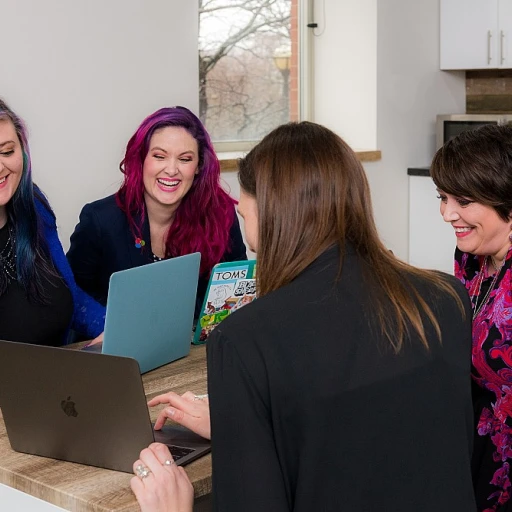Understanding the Role and Company Culture
Delving into Company Values and Expectations
Before stepping foot into any HR interview, particularly when aiming to master it, it's crucial to immerse yourself in understanding the company's role and its culture. This knowledge not only frames your responses but also helps pinpoint whether your personal values align with those of the company.
Start your preparation by thoroughly reviewing the company's website, focusing on their mission statement, vision, and core values. These elements convey what the organization stands for and its long-term aspirations. Pay attention to any recent news or developments, as these can offer a glimpse into the company's current priorities and future direction.
Additionally, consider visiting https://www.hr-job-interviews.com/blog/unlocking-the-secrets-of-hr-interview-questions for insights into the kind of questions you might face when discussing role specifics or company culture. Their questions often reflect what they truly value in their employees, so being well-versed in this area can give you a competitive edge.
Engage with current or former employees, if possible, through platforms like LinkedIn. Their experiences and insights can provide real-world perspectives on the company culture that goes beyond formal statements. Understanding the everyday environment and expectations can significantly aid in presenting yourself as the ideal candidate.
Finally, reflect on how your experiences and career goals align with what you have learned about the company. This reflection allows you to tailor your narrative and examples during the interview, ensuring they resonate with the interviewers and demonstrate your genuine interest and fit for the role. By approaching the interview with this depth of understanding, you're setting the stage for a productive and positive conversation, coupled with a readiness to showcase your soft skills and technical abilities in later parts of the interview process.
Common Interview Questions and How to Answer Them
Frequently Asked HR Interview Questions
Navigating the landscape of HR interviews requires a strategic approach, particularly when it comes to responding to commonly asked questions. Understanding the types of inquiries you may encounter can significantly boost your confidence and performance during the interview. Here are some typical questions you might face:
- Tell me about yourself.
This classic icebreaker is more than just a formality. Approach it as an opportunity to present your professional journey, focusing on experiences and skills relevant to the HR role. Structure your response to highlight your growth and achievements within the sector.
- Why do you want to work for our company?
Show that you have done your homework by aligning your career goals with the company's mission and values. This reflects not only your enthusiasm but also your understanding of the company culture, which is an aspect previously discussed in our series.
- How do you handle conflict resolution?
The HR function often plays a pivotal role in managing organizational conflicts. Share an instance where you successfully navigated a conflict, detailing the skills and strategies you employed to arrive at a resolution. Emphasizing your interpersonal and soft skills can be crucial here.
- Describe a challenging HR project you participated in.
This question aims to assess your problem-solving and critical-thinking abilities. Choose a project that showcases your competency in dealing with complex situations, discussing the approach you adopted and the impact of your contributions.
- What are your thoughts on the latest HR trends?
Stay informed about recent developments and future trends in HR. Express your opinions and insights, demonstrating your proactive attitude towards continuous learning in the field. This shows your commitment to staying ahead in the dynamic world of human resources.
Answering these questions effectively can set you apart from other candidates and significantly enhance your interview performance. For more strategies on how to ace your HR interview, you can explore additional insights on
mastering HR interview skills for success. Embrace preparation as your ally, and approach your interview with the confidence and clarity needed to make a lasting impression.
Showcasing Your Soft Skills
Demonstrating Emotional Intelligence and Adaptability
In today’s dynamic workplace, showcasing your soft skills is a crucial aspect of HR interviews. These skills distinguish top candidates by demonstrating the ability to interact effectively, adapt to challenges, and navigate interpersonal relationships with ease. Among the qualities that HR professionals value highly are emotional intelligence and adaptability.
Emotional intelligence encompasses self-awareness, self-regulation, empathy, and social skills. When you harness these attributes during an interview, you show your potential as not just a qualified candidate, but someone who can positively influence the company culture, aligning with the expectations discussed previously. Consider sharing past experiences where you successfully managed a team or resolved a difficult situation by exhibiting your emotional intelligence.
Adaptability is another soft skill HR professionals are keen to explore. A candidate who can pivot and adjust to changing circumstances becomes an invaluable asset. Illustrate your capacity to adapt by highlighting moments where you navigated unexpected changes or embraced new technology to enhance workflow. These examples provide tangible evidence of your capability to thrive in a dynamic environment.
By understanding and effectively communicating your soft skills throughout the
interview process, you are not only answering the immediate questions but offering insight into your potential as a holistic and versatile employee. Make sure your responses are tangible, sincere, and reflective of the strength you bring to the table. This nuanced approach paves the way for making a lasting impression and achieving success in HR interviews.
Preparing for the Interview: Practical Tips
Research and Rehearse
Preparing for an HR interview involves more than merely understanding the role and company culture or crafting carefully thought-out answers to common interview questions. It’s about taking a comprehensive approach to ensure you're not only ready to face the interview panel but also to make a lasting impact.
Begin by thoroughly researching the organization, its values, and recent developments, which can help in tailoring your responses to be more aligned with what the company stands for. Familiarize yourself with the company's mission and any initiatives that showcase their culture and priorities. This will also aid in aligning your answers with what the company values most.
Next, engage in mock interviews to practice articulating your thoughts clearly and confidently. Consider reviewing commonly asked questions not just for direct responses but also for showcasing your relevant experiences, as discussed in earlier parts of this article. Practicing with a friend or mentor can provide valuable feedback and help you refine your delivery.
Organizing Documents and Logistics
The practical aspects of interview preparation shouldn’t be overlooked. Start by gathering all necessary documents, such as multiple copies of your resume, a list of references, and any certifications that might be relevant. Organize them neatly in a portfolio to present a professional image.
Ensure you know the exact location and time of your interview. Plan your route in advance, considering possible delays. This will help in reducing stress levels on the actual day, allowing you to maintain focus and calmness.
Dress for Success
Your attire can speak volumes before you even say a word. Choose clothing that’s appropriate for the company culture, which might range from business formal to smart casual. The key is to look polished and feel comfortable, boosting your confidence as you step into the interview room.
By following these preparation tips, you’ll be better equipped to handle your HR interview with poise and assurance, increasing your chances of making a favorable impression.
Making a Positive Impression
Crafting a Memorable First Impression
When entering an HR interview, making a memorable first impression is crucial. The importance of this initial encounter cannot be overstated, as it sets the tone for the interview and influences how the rest of the session unfolds. Here's how you can put your best foot forward:
First, punctuality is key. Arriving on time shows that you're reliable and respectful of the interviewer's schedule. Aim to arrive a few minutes early to allow time for unexpected delays and to compose yourself before the meeting begins.
Your appearance also plays a significant role in the impression you make. Dressing appropriately for the company's culture is essential. When in doubt, opt for professional attire that matches the organization’s norms, which ties back to understanding the workplace environment as discussed earlier.
Presentation extends beyond clothing, encompassing your body language. Encouraging non-verbal cues, such as maintaining eye contact and offering a firm handshake, convey confidence and openness. Avoid crossing your arms, which can be perceived as defensive. Instead, adopt open postures that promote engagement with your interviewer.
Lastly, greeting the interviewer with a sincere smile and expressing enthusiasm for the opportunity helps establish a connection. Demonstrating genuine interest in the role and the company resonates well with interviewers and further solidifies a positive impression.
With these strategies at your disposal, you'll be better equipped to set the right tone and leave a lasting mark from the start of your HR interview journey.
Following Up After the Interview
Crafting Your Follow-Up Strategy
Having aced the HR interview, from perfectly understanding the role and company culture to showcasing your soft skills, it's crucial not to overlook the importance of a solid follow-up. This final step in the interview process is not just a courtesy, but an opportunity to reinforce your fit for the position and leave a lasting impression.
To start, within 24 hours after the interview, it is advisable to send a thoughtful thank-you email to your interviewers. Personalize each email based on specific discussions you had during the interview. If you had the chance to speak with multiple interviewers, customize every message, ensuring that each reference is relevant to the conversation that took place.
In your thank-you email, express gratitude for the opportunity and reaffirm your enthusiasm for the role and the company. Mention any key points from the interview that particularly resonated with you, such as aspects of the company culture or specific challenges in the role that you are eager to tackle. This not only shows that you are attentive, but also highlights your continued interest in contributing to their team.
Additionally, if there was a question you feel you could have answered better or a topic you weren't able to delve into as much as you'd like, this is your chance to address it. Clarifying or adding to your responses can demonstrate your thoroughness and sincerity in ensuring they have the full picture of your capabilities.
Finally, if you do not receive a response to your initial follow-up, don’t hesitate to send a polite check-in email after a week or so. Keep the tone positive and professional; reiterate your interest in the role and inquire about the next steps in the hiring process. This approach shows persistence and genuine interest, qualities that HR professionals value.
Concluding your interview process with a strategic follow-up can significantly bolster your chances of securing the role. It underscores your professionalism and reinforces the positive impression you aim to achieve from the beginning through to the end of the recruitment journey.








